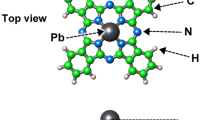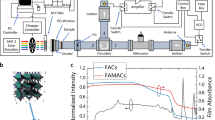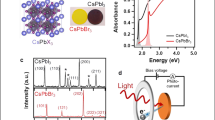Abstract
WE have investigated the dark- and photo-conductivity of single crystals of metal-free and some transition metal phthalocyanines. Some of our results for metal-free, zinc, copper, nickel and cobalt phthalocyanines have been published elsewhere1. Meanwhile we have extended our investigations to include ferrous and manganous phthalocyanines. Here we wish to report briefly that we have found manganous phthalocyanine to differ in its behaviour from the other members of the series in a striking manner. The measurements were made on the needle-shaped crystals using two electrodes. No guard ring was used, and the arrangement is therefore equivalent to a surface conductivity cell.
This is a preview of subscription content, access via your institution
Access options
Subscribe to this journal
Receive 51 print issues and online access
$199.00 per year
only $3.90 per issue
Buy this article
- Purchase on Springer Link
- Instant access to full article PDF
Prices may be subject to local taxes which are calculated during checkout
Similar content being viewed by others
References
Day and Williams, J. Chem. Phys., 37, 567 (1962).
Author information
Authors and Affiliations
Rights and permissions
About this article
Cite this article
DAY, P., SCREGG, G. & WILLIAMS, R. Photoconductivity of Manganous Phthalocyanine. Nature 197, 589–590 (1963). https://doi.org/10.1038/197589b0
Issue Date:
DOI: https://doi.org/10.1038/197589b0
This article is cited by
-
The effect of central metal atom on the electrical properties of phthalocyanine macromolecule
Journal of Electronic Materials (1988)
Comments
By submitting a comment you agree to abide by our Terms and Community Guidelines. If you find something abusive or that does not comply with our terms or guidelines please flag it as inappropriate.



